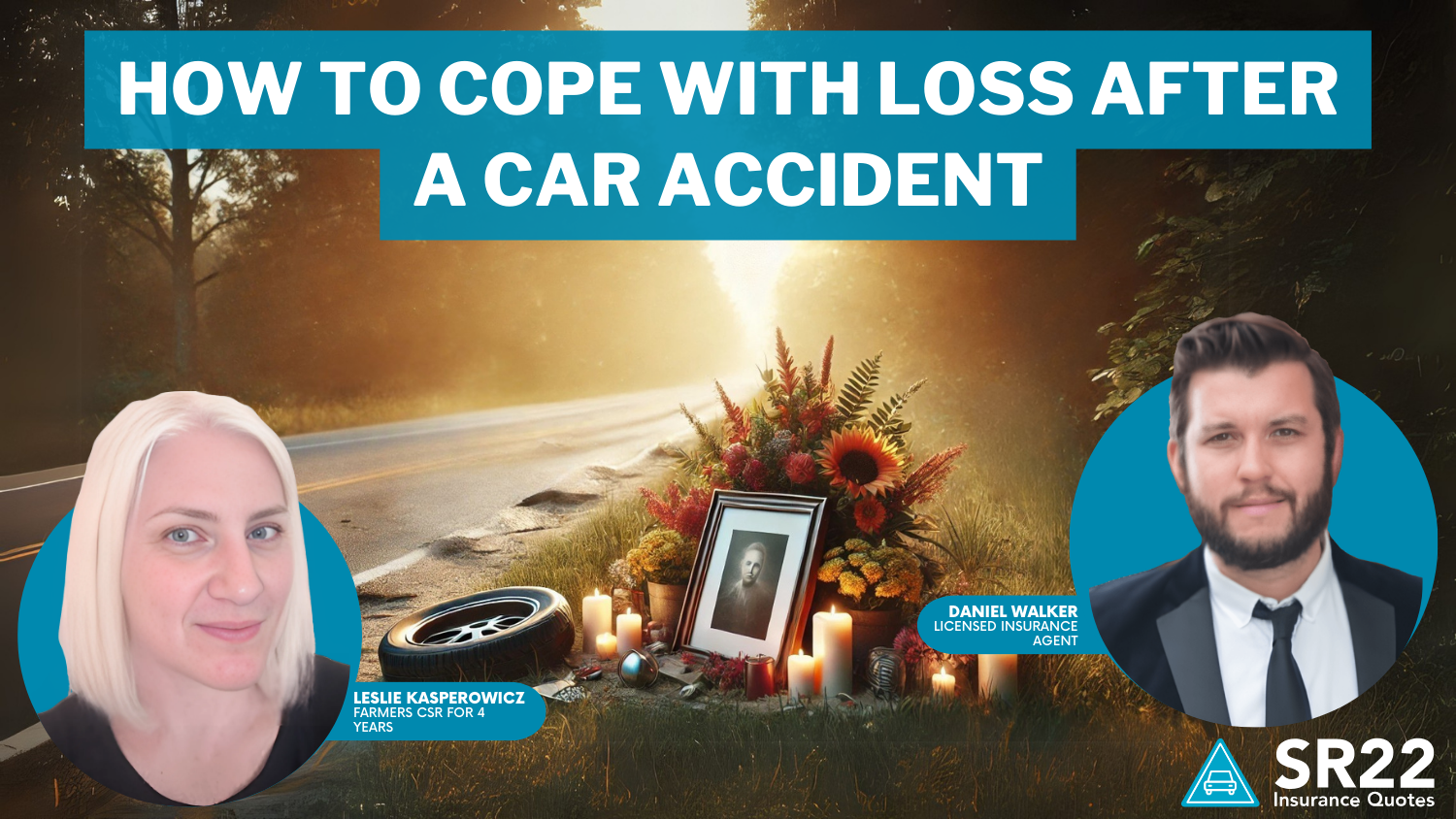Coping with Death After a Car Accident

Free Car Insurance Comparison
Compare Quotes From Top Companies and Save
Secured with SHA-256 Encryption
Daniel Walker
Licensed Insurance Agent
Daniel Walker graduated with a BS in Administrative Management in 2005 and has run his family’s insurance agency, FCI Agency, for over 15 years (BBB A+). He is licensed as an insurance agent to write property and casualty insurance, including home, life, auto, umbrella, and dwelling fire insurance. He’s also been featured on sites like Reviews.com and Safeco. To ensure our content is accura...
Licensed Insurance Agent
UPDATED: Mar 26, 2025
It’s all about you. We want to help you make the right coverage choices.
Advertiser Disclosure: We strive to help you make confident insurance decisions. Comparison shopping should be easy. We are not affiliated with any one insurance provider and cannot guarantee quotes from any single provider.
Our insurance industry partnerships don’t influence our content. Our opinions are our own. To compare quotes from many different companies please enter your ZIP code on this page to use the free quote tool. The more quotes you compare, the more chances to save.
Editorial Guidelines: We are a free online resource for anyone interested in learning more about auto insurance. Our goal is to be an objective, third-party resource for everything auto insurance related. We update our site regularly, and all content is reviewed by auto insurance experts.
UPDATED: Mar 26, 2025
It’s all about you. We want to help you make the right coverage choices.
Advertiser Disclosure: We strive to help you make confident insurance decisions. Comparison shopping should be easy. We are not affiliated with any one insurance provider and cannot guarantee quotes from any single provider.
Our insurance industry partnerships don’t influence our content. Our opinions are our own. To compare quotes from many different companies please enter your ZIP code on this page to use the free quote tool. The more quotes you compare, the more chances to save.
On This Page
Grieving Guidelines for Sudden Loss
Losing someone you love suddenly and without warning can feel like your worst nightmare has come true. For those that have lost a loved one in a car accident, it can be difficult to deal with the ripple effects of sudden loss as part of the grieving process. If you have lost someone in a car accident, you are certainly not alone.
1.3 Million
people die in car crashes each year
This equates to:
3287 deaths a day
According to the Association for Safe International Road Travel. In fact, car accidents are ranked as the ninth leading cause of death, adding up to 2.2% of deaths worldwide.
400000
Averaging out to
1000 people/day
people under the age of 25 die in fatal car accidents each year
To lose someone at such a young age in a senseless accident is, without a doubt, a tragedy. Even worse is the fact that car accidents are on the rise, predicted to jump to the fifth leading cause of death by 2030.
Teen Deaths by Day of Week
Although car accidents may seem few and far between in your neck of the woods, consider these shocking statistics:
- 1600 children under 15 die in car accidents each year.
- 8000 Drivers aged 16-20 die in car accidents.
- 211 children were killed in drunk driving accidents in 2010.
- 62% of the children were riding with a drunk driver.
Children that start drinking at a young age are seven times more likely to be involved in a drunk driving accident. Car accidents are the number one cause of death for teens.
- 33% of the accidents are alcohol related.
- 27 people die in the US each day in DUI crashes.
- Teen alcohol use kills roughly 6000 people/year
The truth is that a car accident can easily result in death, especially when necessary precautions aren’t taken beforehand, such as wearing a seatbelt and driving within the speed limit.
To add to that risk, drunk driving is a serious offense that is likely to result in a fatal accident for both the driver and the other parties involved. Mothers Against Drunk Driving confirms that 1 in 3 People will be involved in a drunk driving crash in their lifetime.
While it’s important to do your part to drive safely and discourage drunk driving, accidents can still happen.
Some of the top causes of car accidents include:
- Distracted driving – number one cause of car accidents, above drunk driving.
- Speeding – faster driving means a slower reaction time.
Drunk driving – reduces the ability to function and react behind the wheel.
- Reckless driving – speeding, quickly changing lanes, and tailgating.
- Weather Conditions – even light drizzle can create slick and dangerous roadways.
- Running a red light – increases the risk of side-impact and rollover accidents.
- Running a stop sign – increases the risk of side-impact, high-speed accidents.
- Teen drivers – more likely to be reckless and distracted behind the wheel.
- Night driving- may nearly double the risk of a car accident compared to day driving.
The top causes for car accidents listed above aren’t all-inclusive by any means, but they often result in serious accidents. Other factors that may contribute to a severe or fatal car crash include:
- Dangerous lane changes
- Driving the wrong way down a one-way street
- Unsafe turns
- Driving on sharply curved roads
- Driving while impaired by drugs
- Driving while fatigued
- Road rage
- Tire blowouts
Given the many factors that can contribute to a fatal car accident, it’s difficult to predict the outcome each time you get behind the wheel. Even when driving safely and soberly, it’s entirely possible to get
into a serious or fatal car crash. This risk is increased even further when driving drunk or engaging in unsafe driving behaviors.
For many people, unexpected death caused by a car accident can be harder to cope with because the loss is so sudden. Losing a parent, a spouse, or a child in a car crash doesn’t give you time to prepare for such a tragic turn of events. You didn’t have the chance to say goodbye. You may be running your last conversation with your loved one over and over in your mind, full of regret for words left unsaid.
After losing someone in a car accident, you may feel cheated by death.

that can make it tougher to process the death of a loved one, lengthening the grieving process.
In addition to grief, you may experience your own emotional repercussions or “ripple effects” after an accident. This is even more relevant if you were involved in the car accident that took a loved one from you.
You may feel unsafe, uncertain, and fearful in your own world. It’s also normal to feel angry, frustrated, and wronged by the unfairness of it all.
How do you handle such a sudden, devastating loss? Read on for helpful guidelines to cope with grief after a car accident.
The Aftermath
Grieving After a Car Crash or DUI Accident
The impact of sudden death is not to be underestimated. Anytime death is experienced, pain and grief are automatic byproducts. But when the death of a loved one is sudden, it’s almost impossible to cope and move forward from the shock of an accident. Abrupt loss can be overwhelming since it disrupts the normal, peaceful flow of a once-happy life.
Immediately after an accident, the sudden death of a loved one may not make sense. It may be hard to accept that someone once so present in your life is gone forever. It may be difficult to process death as the result of a car crash, especially if you were involved in the accident. It could take days or weeks to fully understand that a friend, sibling, spouse, or child has died. Emotions may feel dull and numb for a period of time until you come to accept the loss as reality.
Many survivors of car accidents find that they have to repeat the events of a crash over and over again to process the death as fact. It’s also common to obsess over or pick apart the events leading up to an accident to determine what went wrong, if things could have been done differently, or if you were at fault in any way.
Rest assured that deconstructing the events of an accident is perfectly normal. It can help you to logically grasp what has happened and make it easier to understand such a tragic event. In this way, sudden loss is different from expected loss because an instantaneous emotional blow has been dealt; as the shock begins to wear off, grief symptoms may feel intense and devastating.
Grieving a sudden loss may bring up conflicting emotions like:
- Confusion
- Anxiety
- Blame
- Depression
- Guilt
- Anger
This mixed bag of emotions has been studied for decades and categorized by a number of therapists into separate “stages” of grief. The official 5 Stages of grief were first created by Elsabeth Kubler-Ross in 1969 and include:
- DENIAL – After losing someone in an accident, you may automatically deny that the loss has occurred. Denial can be used to “rationalize” and cope with such shocking, unpleasant emotions in the aftermath of a tragedy. Denial is temporary and will likely progress into anger or frustration.
- ACCEPTANCE – It could take years to reach this final grieving stage of acceptance. If loss is unexpected, it may be difficult to get past denial, anger, or even depression. It’s also possible to reach acceptance in some areas while still coping with waves of grief that arise when certain events trigger memories of the loss.
- ANGER – As you grasp the reality of what has happened in permanent yet sudden loss, you may feel unprepared to deal with the hand life has dealt you. You may feel angry at a loved one that has left you, or you may blame yourself for accidentally causing a fatal crash. Even more likely is the fact that you will feel guilty for your anger, which will only compound the emotion and make you more frustrated.
- BARGAINING- After or amidst anger in the grieving process comes bargaining. In this stage, you may try to gain control over an unpredictable situation that has impacted your life forever. You may try to figure out what you could have done to change the outcome by telling yourself, “If only I hadn’t taken that route, my daughter would still be alive.” Or, “If I had taken his keys, maybe he wouldn’t have driven drunk.”
- DEPRESSION – It’s not unusual to feel sad and depressed after such a loss. During this time, you need all the help, encouragement, and support you can get from friends and family. If depression progresses to the point where you isolate yourself, can’t get out of bed in the morning, or consider ending your life, it’s critical to ask for help right away.
Keep in mind that these stages of grief are merely guidelines that can help accident survivors and those that have lost loved ones better understand the grieving process.
With sudden loss comes sudden grief
You may find that your grief follows a predictable pattern, like the stages listed above. Or, your grief may be all over the map as you try to make sense of the tragedy that has occurred. You may feel depressed
immediately, then in denial, then angry, and then depressed again.
There is no perfect recipe for grief. Still, it helps to understand how emotions unfold and progress while coping with loss to guide you through the murky waters of bereavement.
The best thing that you can do throughout the grieving process is to be kind to and understanding of yourself. Grief is individual and will take time. Your grieving process may not look like anyone else’s and could take longer than you expect.
Compare quotes from the top car insurance companies and save!
Secured with SHA-256 Encryption
Real Life Grief
Losing a Son
How would you react if the unthinkable happened? Just ask Maureen Hunter, a mother that received the most tragic news of her life in 2006.
Maureen’s 18-year-old son was injured in a car accident in 2006 and died five days later in the hospital. Maureen immediately felt the gripping effects of grief as she wept openly and often while looking at her son’s pictures.
According to Maureen, “I didn’t think I could survive and didn’t know how I would. At times, I didn’t much want to either.”
Ultimately, Maureen decided to embark on a healing process to recover from the loss of such a senseless accident. Maureen confirms that her grief was individual and provides these helpful tips for coping with sudden loss:
Get out feelings and emotions however possible – screaming, talking, or writing helps.
- Keep your relationship with your lost loved one strong; talk to, write to, and connect with the one you lost, even after they are gone.
- Stick with a routine, especially in the early days.
- Do something nice for yourself often.
- Be thankful every day.
- Realize that you can’t change the past, no matter how hard it is to accept.
- Actively seek out support; don’t ever deal with grief alone.
- Read to gather more information about loss for inspiration.
- Go outside every day to connect with nature.
- Start new rituals to honor your lost loved one –plant a memory garden, light candles, and remember the anniversary of their death.
- Encourage compassion by giving back to others.
What is Grief, and how Does it Affect You?
It’s worth being said again:
You are not alone in your grief. Unfortunate, tragic accidents happen more often than many of us realize.
1 in 9
Americans will lose a parent before the age of 20.
1 in 7
Americans will lose a parent or sibling before age 20.
Losing a parent at a young age is devastating. According to a Comfort Zone Camp survey:
of survey participants would trade a year of their life to have one more day with their departed parent.
of participants believe that their life would have been “much better” if they didn’t lose a parent at a young age.
of those who lost a parent in childhood still think about that parent often as an adult.
6 in 10
Americans that lost a parent in childhood reveal that it was the hardest thing they ever had to deal with.
- Sorrow
- Yearning/nostalgia
- Trouble concentrating
- Dreams of the deceased
- Loneliness
- Trouble sleeping/ insomnia
- Longing
- Overwhelming sadness
- Frequent crying
 The majority of grief sufferers that participated in the survey felt that friends and colleagues were only able to understand their grieving process some of the time. However, survey participants did feel grief support from their family most of the time.
The majority of grief sufferers that participated in the survey felt that friends and colleagues were only able to understand their grieving process some of the time. However, survey participants did feel grief support from their family most of the time. When the grief sufferers were asked how long it took to get “back to normal,” the majority revealed that they never went back to feeling like their old self again. More than 25% of the participants agreed that it took anywhere from 1 to 2 years to return to normal life after loss.
When the grief sufferers were asked how long it took to get “back to normal,” the majority revealed that they never went back to feeling like their old self again. More than 25% of the participants agreed that it took anywhere from 1 to 2 years to return to normal life after loss.Clearly, when it comes to grief, there are no rules. Grief affects each and
every one of us in different ways with various, conflicting emotions. Better understanding grief and the grieving process can make it easier to cope with a sudden loss and regain some semblance of normal life.
As you process your grief, you may find that there are a number of grieving myths that are prevalent among friends and family members, like:
- Grief happens in stages – while many people identify with the 5 Stages of Grief listed above, it’s typical to oscillate back and forth between stages or skip stages altogether.
- Grief must be expressed – One 2007 study conducted by a Columbia University Teachers College professor revealed that grief sufferers that didn’t freely release negative emotions were less anxious and depressed six months after loss. According to the study, avoiding negative feelings may protect you in the grieving process.
- Women have a harder time coping with loss – while a number of grief counselors believe that women and men process grief differently, a 2001 research analysis debunks the myth that women grieve more – men may suffer more after loss than women.
- Grief can last a lifetime – not always. In a 2002 study published in the Journal of Personality and Social Psychology conducted on elderly adults that lost a spouse, 45% of participants showed no signs of grief six months after loss.
Now that you understand what grief is not, here are a few helpful facts to
remember about the grieving process:
- You may naturally fluctuate between strong grieving emotions and set stages of grief.
- Grief may feel permanent, but it’s not likely to last forever.
- Grief counseling may not always be necessary in the healing process.
- Laughter may not be the best medicine, but humor and lightheartedness can support healing.
- Your grief may not look like grief; coping styles are individual.
Stages of Grief
- Loss Hurt
- Shock
- Numbness
- Denial
- Emotional outbursts
- Anger
- Fear
- Searchings
- Disorganization
- Panic
- Guilt
- Loneliness
- Depression
- “Re-Entry”
- Troubles
- New relationships
- New strengths
- New patterns
- Hope
- Affirmation
- Helping others
- Loss adjustment
Essential Guidelines to Cope with Grief
Even if you have the best support system around you, it can feel overwhelming at best to face any stage in the grieving process. You can use these helpful tips as guidelines to navigate your grief and cope with sudden loss:
- Ask friends and family members for help, support, and encouragement.
- Join a support group to draw strength from other survivors.
- Put work into processing grief and know that it will take time.
- Let yourself feel each emotion or stage fully as it comes.
- Leave time and space for grief as you resume your normal life.
- Take care of yourself as a top priority to heal emotional wounds.
- Try to resist drugs or alcohol to numb or cope with pain.
- Explore faith or a higher power to cultivate inner strength.
- Don’t let yourself or anyone else tell you how to feel in the grieving process.
- Anticipate grief triggers that may appear as setbacks.
Survivorship Guilt
Grief after a car crash may become even more intense if you were involved in or even caused the accident. Survivor’s guilt is often associated with PTSD, or Post Traumatic Stress Disorder.
If you feel that you may be experiencing PTSD or survivor’s guilt after a crash, it’s important to seek counseling immediately. Not addressing these issues can make it almost impossible to move forward and fully process grief after sudden loss.
If you feel that you may be experiencing PTSD or survivor’s guilt after a crash, it’s important to seek counseling immediately. Not addressing these issues can make it almost impossible to move forward and fully process grief after sudden loss.

Consider these helpful tips to comfort a grieving friend in need:
- Become familiar with the stages of grief to offer support.
- Understand that grief may not follow a particular pattern or course; mourning is individual.
- Don’t place unnecessary expectations on a friend that has suffered a loss.
- Participate in memorial activities, like an anniversary service or remembrance gathering for a lost loved one.
- Ask what a grieving friend needs from you; listening is often enough.
 If it feels like loss is overwhelming, or if you have felt crippled by grief for years, it may be time to seek professional help.Losing someone close to you in a sudden car accident is unthinkable. While grief may take time, long-lasting symptoms of sadness, fear, and anger could be indicators of depression.
If it feels like loss is overwhelming, or if you have felt crippled by grief for years, it may be time to seek professional help.Losing someone close to you in a sudden car accident is unthinkable. While grief may take time, long-lasting symptoms of sadness, fear, and anger could be indicators of depression.You may be suffering from grief-related depression if you have also noticed changes in your sleeping patterns, fatigue, loss of appetite, or an unwillingness to participate in regular activities. While grief is entirely normal after sudden loss, there’s no need to suffer in silence. If grief symptoms have lasted for longer than two months, it may be time to contact a therapist for the help and support you need to move forward.
Compare quotes from the top car insurance companies and save!
Secured with SHA-256 Encryption
Daniel Walker
Licensed Insurance Agent
Daniel Walker graduated with a BS in Administrative Management in 2005 and has run his family’s insurance agency, FCI Agency, for over 15 years (BBB A+). He is licensed as an insurance agent to write property and casualty insurance, including home, life, auto, umbrella, and dwelling fire insurance. He’s also been featured on sites like Reviews.com and Safeco. To ensure our content is accura...
Licensed Insurance Agent
Editorial Guidelines: We are a free online resource for anyone interested in learning more about auto insurance. Our goal is to be an objective, third-party resource for everything auto insurance related. We update our site regularly, and all content is reviewed by auto insurance experts.

 Drunk driving – reduces the ability to function and react behind the wheel.
Drunk driving – reduces the ability to function and react behind the wheel.




